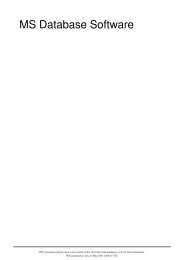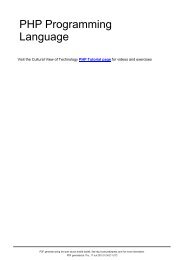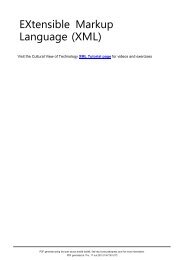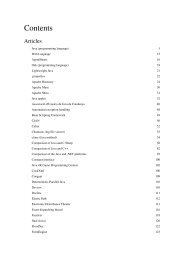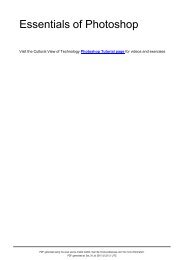Essentials of Javascript - Cultural View
Essentials of Javascript - Cultural View
Essentials of Javascript - Cultural View
You also want an ePaper? Increase the reach of your titles
YUMPU automatically turns print PDFs into web optimized ePapers that Google loves.
JSON 99<br />
{<br />
}<br />
"firstName": "John",<br />
"lastName": "Smith",<br />
"age": 25,<br />
"address": {<br />
},<br />
"streetAddress": "21 2nd Street",<br />
"city": "New York",<br />
"state": "NY",<br />
"postalCode": "10021"<br />
"phoneNumber": [<br />
]<br />
{ "type": "home", "number": "212 555-1234" },<br />
{ "type": "fax", "number": "646 555-4567" }<br />
A possible equivalent for the above in XML could be:<br />
<br />
<br />
212 555-1234<br />
646 555-4567<br />
<br />
Since JSON is a subset <strong>of</strong> JavaScript it is possible (but not recommended) to parse the JSON text into an object by<br />
invoking JavaScript's eval() function. For example, if the above JSON data is contained within a JavaScript string<br />
variable contact, one could use it to create the JavaScript object p like so:<br />
var p = eval("(" + contact + ")");<br />
The contact variable must be wrapped in parentheses to avoid an ambiguity in JavaScript's syntax. [6]<br />
The recommended way, however, is to use a JSON parser. Unless a client absolutely trusts the source <strong>of</strong> the text, or<br />
must parse and accept text which is not strictly JSON-compliant, one should avoid eval(). A correctly implemented<br />
JSON parser will accept only valid JSON, preventing potentially malicious code from running.<br />
Modern browsers, such as Firefox 3.5 and Internet Explorer 8, include special features for parsing JSON. As native<br />
browser support is more efficient and secure than eval(), it is expected that native JSON support will be included in<br />
the next ECMAScript standard. [7]<br />
JSON schema<br />
There are several ways to verify the structure and data types inside a JSON object, much like an XML schema.<br />
JSON Schema [8] is a specification for a JSON-based format for defining the structure <strong>of</strong> JSON data. JSON Schema<br />
provides a contract for what JSON data is required for a given application and how it can be modified, much like<br />
what XML Schema provides for XML. JSON Schema is intended to provide validation, documentation, and<br />
interaction control <strong>of</strong> JSON data. JSON Schema is based on the concepts from XML Schema, RelaxNG, and<br />
Kwalify, but is intended to be JSON-based, so that JSON data in the form <strong>of</strong> a schema can be used to validate JSON<br />
data, the same serialization/deserialization tools can be used for the schema and data, and it can be self descriptive.



